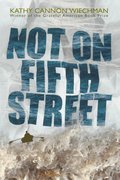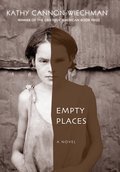



By Melissa Warner Published February 13, 2022
Despite finding history very boring when she was young, author Kathy Cannon Wiechman (pronounced “Weak-min”) has written three YA historical fiction novels. “History class was boring, memorizing dates and names and places were just meaningless terms.” In spite of that, historical fiction novels were her favorite kind of book. “I want to write books that make history come alive for today’s young people…so that they won’t shove [history] in the corner as boring the way I thought it was at first.” When asked if writing was easier without having to address technology (her present work in progress is the most current time wise, taking place in 1977), Ms. Wiechman acknowledged her own present, personal dependence on technology, but stated that “Historical fiction was made for me because I’m so comfortable in the past.” Authors, more than books, have inspired her such as Laura Ingalls Wilder and Ann Rimaldi. She feels that they are examples of historical fiction authors that put the reader “there,” and “that’s what I try to do with my books; I try to put a reader ‘there.’”
Ms. Wiechman did not initially intend to write a YA book. She has written some others that are “definitely middle grade, but the historical events that I write about need a somewhat older protagonist” such as in Like a River, her first published and award winning YA historical novel. “A 12 to 13 year old couldn’t live through those experiences.” However, she now plans “very much” to continue writing YA, although if, in her research she came across an incident that could be “told through an 11 or 12 year old protagonist,” she would “follow that inclination.” For her, the subject matter is the determining factor, it “always depends on the historical event I’m trying to bring to life and who’s the best character to bring it to life.” Yet, she is “stunned” and “delightfully surprised” by how many adults like her books.
One time, this author was asked “what message” should be taken from one of her books. She does not try to put a message in her books. “I try to tell a good story. If, in reading that good story, somebody develops an interest…or learns something about history they didn’t know before, that’s a bonus. My main goal is to tell a good story.” She noted that history was easier to remember when one is “hooked to a story” or “emotionally involved” in it.
Accuracy of history is very important to Ms. Wiechman. “I try to make the history in my books be completely factual. The only thing that is fiction is the people who are living through the events and I try to base those people on the kind of people who would have experienced it.” Others have provided critique for her writing and made suggestions that might make the writing or reading easier. Ms. Wiechman rejects anything that “really didn’t happen that way.” Even though her novels are fiction, “The history is important. I want to get the history right first and I’m really particular about that…If I want to interest readers in history, then my history better be right on.” Sometimes this causes her difficulty with her characters. While hers do not “speak” to her as some authors describe, “they might take the story in a different direction than I planned…because I’ve created this character so fully and I’m trying to make them go somewhere and they’re saying ‘no, I wouldn’t do that’…I have to make the history stay the same. So then I either have to recreate the character or rearrange the story.”
Ms. Wiechman has considered writing nonfiction, and her editor has encouraged her to do so. Yet, she has “resisted” it “because to write well, for me, I have to be able to get into my character’s head, and if it was a real person, there’s already somebody in that head. I know that sounds funny! I’m totally serious. I can’t figure out exactly what they thought and how they felt. I can guess from their writings and things people said about them, but I can’t get into their heads…The only way I can write a character well is to be inside his or her head…I need a fictional person to be my main character because then I can be in his head.”
Her first published novel, Like A River, and her most recent novel, Not on Fifth Street, both involve water but the common element was unplanned. She lives in a city on the Ohio River, and that environment plays some part in her writing. Like A River was sparked by something else entirely, the Sultana steamboat disaster on the Mississippi. Most of those survivors had come from the Civil War prison in Andersonville, Georgia. From there she researched the prisons, and the former prison site now houses a POW museum she described as “haunting.” Her research took her there, and gave her the idea for the main and other characters in that book. She had not planned to write about a prison camp until that visit, but “knew I had to write a book that did justice to them, that showed what they went through.” During the writing, she kept the picture of an actual POW from that camp pinned on the bulletin board above her desk, “to represent all the POWs that I read about and saw things about.”
Not on Fifth Street came from stories of the 1937 flood her father lived through and Ms. Wiechman grew upon hearing about. For this book, “I tossed around main characters in my head for years…You don’t sit down and write a book. It sort of stews around in your head for however long it stews in your head before you get enough to put something down on paper.” Once she “decided it’s time to write this story,” she “went through memories I had from my dad. I knew that he was listed as missing during the flood but I didn’t have any details on that. His sister was still living at that time and I talked to her. When I started writing it, I had no intention of setting it in that house, but once I started writing it just happened. I knew that house so well I could picture every nook and cranny of that house in my mind that it was easy to put these fictional characters in that house. Some of the incidents that Pete and Gus go through in that book are things I got from my aunt, that she remembered from when they went through the flood. She’s the one who remembered that they had the coal oil stove that was the only thing they had for power…So I took incidents from real life but then I took some fictional characters and it was almost like taking two separate things and then weaving them together or braiding them together in some way.”
This author started writing when she was five years old. When her mother, born in Germany and a “published poet,” saw Ms. Wiechman’s interest in writing, she “thought I should learn how to do it right,” and taught her many things, including “rhyme and meter.” Yet, she was not aware she could get paid for being a writer. As a young child, she imagined she might be a playwright or poet, not necessarily a writer. By age 15 however, she was thinking about writing novels. “It was in my blood all the way back then.” High school activities, in addition to “advanced” classes and a “high load of class material,” included bowling, playing softball, being involved in the civics club, and one year in the drama club. What she knows now that she wishes she had known as a teenager is that “the things that I thought were devastating in high school weren’t so devastating.” As a teen, she also did not know “that I would get paid so little as I do for writing.” A common misconception of being a writer is “that I’m rich. Kids ask me if I’m a millionaire and they think because I’m a published author I’m rich.” Yet, if she had one extra hour a day, she would “probably write – boring I know – or read for enjoyment.”
Her most recently completed work was submitted to her editor in late 2021, and as of this writing, she is awaiting revisions. She is now in the early stages of research for a new book set in West Virginia, and has some ideas for a book related to a cousin’s upbringing. This is an especially meaningful possible project as this cousin, who she was very close to, was lost to Covid. Covid, like 9/11, affected this author in that the tragedy stopped her in her tracks for writing. Her project at the time involved a disaster where 165 people died, and it “didn’t seem right” to write about that disaster when the current one involved so many more dying. As with 9/11, she found poetry writing cathartic (you can find her poem on her website http://kathycannonwiechman.com/).
While Like a River was Ms. Wiechman’s first published novel, it was actually her 11th written novel. “I wrote novels for 39 yrs before I sold one of them…I had ten practice novels.” When asked why she thought her book was published versus any other author, she stated that “part of it is persistence or determination…I loved writing too much to not give up…I think part of it was all that practice [and] part of it was that I loved the process so much I’m not afraid to revise. Some think revision is something to dread. I think of it as an opportunity to make it better…I take every opportunity I can to see ‘how can I make this better.’” Even if she were not a published author, “I would still write because I love to do it!”